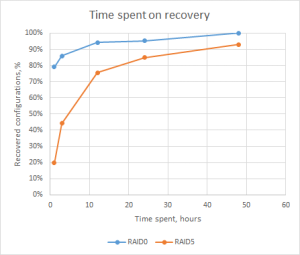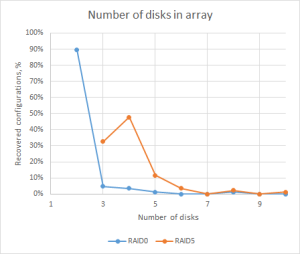RAID recovery research
Research by ReclaiMe in data recovery shows approximately the same number of recoveries in RAID0 and RAID5 plus some other detail.
Volgograd, Russia, July 03, 2014 --(PR.com)-- ReclaiMe Data Recovery, one of the leading data recovery software vendors, today declared the results of the internal research aimed to collect various RAID recovery characteristics. The research found that 79% of RAID0 arrays are recovered within an hour while 93% of RAID5 arrays require 48 hours to complete. Also, the research revealed that among all the recoveries the ratio of RAID0 and RAID5 is approximately the same while RAID6 arrays are not found among the analyzed RAIDs. The analysis of the number of member disks shows that 90% RAID0 cases include just two disks while 81% RAID5 arrays consist of either three or four disks.
The research was conducted during the first half of 2014 and covered about 15000 RAID recoveries.
"Being software developers for data recovery in general and RAID recovery in particular, we are keenly aware that, on the one hand, our task is to help a client to recover data successfully, but on the other hand, it is very important the recovery is done in a reasonable time." – said Elena Pakhomova, the co-founder of ReclaiMe Data Recovery Company. "That's why we decided to do this research aimed to reveal how long does it usually take to recover a RAID. During the research other interesting characteristics associated with RAID recovery such as the number of disks in the original array and distribution of RAID layouts among all the recovery cases were found."
RAID, short for Redundant Array of Independent Disks, is a technology allowing to combine different disks into a single storage. Most common RAID types in use are RAID0 and RAID5. RAID0 is not a redundant array meaning that in case of one disk failure all the data is lost. RAID5 is a redundant array allowing to survive a single disk failure without data loss.
Recovery time
ReclaiMe's research revealed that 79% RAID0 can be successfully recovered within an hour, 100% RAID0 recoveries are complete in 48 hours.
Only 20% RAID5 recoveries can be complete within an hour, it takes 48 hours to complete 93% of all the RAID5 recovery cases.
Such results can be explained by two factors: on the one hand, RAID5 is more complex than RAID0 requires the recovery of additional RAID parameters, on the other hand, RAID5 arrays usually have more disks than RAID0 arrays, affecting the speed of the recovery.
RAID levels involved
ReclaiMe's research revealed that all the RAID recovery cases equally affect RAID0 (48%) and RAID5 (48%); the remaining 4% are RAID10 and RAID6 combined.
Number of disks in RAID
ReclaiMe's research shown that 90% RAID0 arrays involved in recovery consist of two disks. 81% RAID5 recovery cases are represented by the configurations containing three (33%) or four (48%) disks; the remaining 19% fall on the configurations with more disks.
About ReclaiMe Data Recovery
ReclaiMe Data Recovery Company develops data recovery algorithms for various devices, from typical memory cards to complex NAS servers. Company piggy bank includes data recovery algorithms for RAIDs of different types, MS Storage Spaces, and a wide range of filesystems from Microsoft, Linux, and MacOS.
For more information about ReclaiMe and their Free RAID Recovery software, please visit
http://www.FreeRaidRecovery.com
The research was conducted during the first half of 2014 and covered about 15000 RAID recoveries.
"Being software developers for data recovery in general and RAID recovery in particular, we are keenly aware that, on the one hand, our task is to help a client to recover data successfully, but on the other hand, it is very important the recovery is done in a reasonable time." – said Elena Pakhomova, the co-founder of ReclaiMe Data Recovery Company. "That's why we decided to do this research aimed to reveal how long does it usually take to recover a RAID. During the research other interesting characteristics associated with RAID recovery such as the number of disks in the original array and distribution of RAID layouts among all the recovery cases were found."
RAID, short for Redundant Array of Independent Disks, is a technology allowing to combine different disks into a single storage. Most common RAID types in use are RAID0 and RAID5. RAID0 is not a redundant array meaning that in case of one disk failure all the data is lost. RAID5 is a redundant array allowing to survive a single disk failure without data loss.
Recovery time
ReclaiMe's research revealed that 79% RAID0 can be successfully recovered within an hour, 100% RAID0 recoveries are complete in 48 hours.
Only 20% RAID5 recoveries can be complete within an hour, it takes 48 hours to complete 93% of all the RAID5 recovery cases.
Such results can be explained by two factors: on the one hand, RAID5 is more complex than RAID0 requires the recovery of additional RAID parameters, on the other hand, RAID5 arrays usually have more disks than RAID0 arrays, affecting the speed of the recovery.
RAID levels involved
ReclaiMe's research revealed that all the RAID recovery cases equally affect RAID0 (48%) and RAID5 (48%); the remaining 4% are RAID10 and RAID6 combined.
Number of disks in RAID
ReclaiMe's research shown that 90% RAID0 arrays involved in recovery consist of two disks. 81% RAID5 recovery cases are represented by the configurations containing three (33%) or four (48%) disks; the remaining 19% fall on the configurations with more disks.
About ReclaiMe Data Recovery
ReclaiMe Data Recovery Company develops data recovery algorithms for various devices, from typical memory cards to complex NAS servers. Company piggy bank includes data recovery algorithms for RAIDs of different types, MS Storage Spaces, and a wide range of filesystems from Microsoft, Linux, and MacOS.
For more information about ReclaiMe and their Free RAID Recovery software, please visit
http://www.FreeRaidRecovery.com
Contact
ReclaiMe Data Recovery
Elena Pakhomova
+1 202 657 6189
www.ReclaiMe.com
Elena Pakhomova
+1 202 657 6189
www.ReclaiMe.com
Multimedia

Time spent on RAID recovery
Time spent on recovery depending on RAID layout

Number of disks in RAID array
Distribution of number of disks in failed RAIDs
Categories
